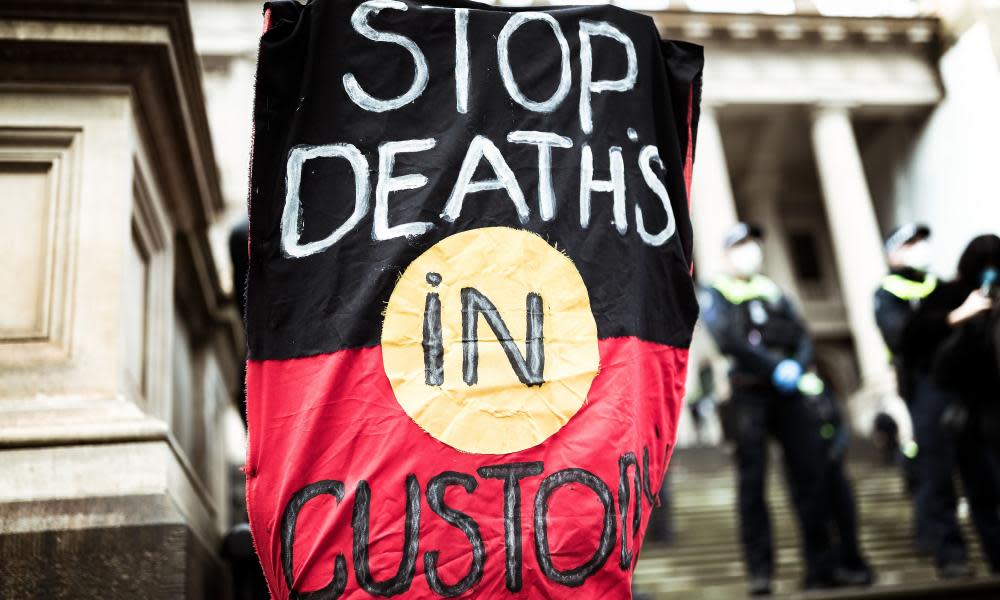Victorian coroner changes how Indigenous deaths in custody are investigated

The coroner’s court of Victoria has changed the way it investigates Indigenous deaths in custody to reflect recommendations made in a royal commission almost 30 years ago, but Aboriginal legal services say they don’t have enough funding to meet the court’s new commitments.
The Victorian state coroner, judge John Cain, issued a practice direction on Tuesday outlining new standards for investigating Indigenous deaths in custody. It includes a requirement that the coroner attend the scene of death where practicable, instead of relying on the report of the police officer conducting the investigation.
The new directions also require the coroner’s court to contact the Victorian Aboriginal Legal Service (VALS) within 48 hours of an Indigenous person dying in custody, to ensure senior next of kin are informed of their rights. They are also required to hold a preliminary directions hearing within 28 days of death.
Related: Queensland police employee suspended after Aboriginal woman dies in custody
The coroner’s Koori engagement unit will remain in contact with the deceased’s family throughout the investigation and prepare a cultural brief for the investigating coroner.
All hearings are to be held in a “culturally appropriate manner” including a smoking ceremony, acknowledgement of country and allowing culturally significant items to be displayed in court.
The change brings Victoria ahead of other jurisdictions, but the state is yet to implement the full recommendations made in the royal commission into Aboriginal deaths in custody some 29 years ago. It also does not address the key concern raised by Aboriginal families over several decades, which is that police should not investigate deaths in custody – particularly deaths in police custody.
Apryl Day, whose mother Tanya Day died in police custody in 2017, has argued that the police investigation that formed the basis of the inquest into her mother’s death was “flawed”.
“Our mum’s case highlights why it’s wrong for police to be investigating the actions of their colleagues. We found the process untrustworthy and unable to provide the justice our mother deserved,” she wrote in Guardian Australia.
Two police officers were referred to the office of public prosecutions over allegations of negligence in their care of Day, but no charges were laid.
In Queensland this week, an unsworn police employee was suspended with full pay as part of the investigation into the death of Aunty Sherry Fisher-Tilberoo, who died in the Brisbane watch house on 10 September. Protesters have called for that investigation, which is being conducted by police on behalf of the state coroner, to be independent.
Cain said the new procedures would make the coroner’s court “a safer and more supportive place for Indigenous families”.
Related: Tanya Day's family 'devastated' that no police will face charges for death in custody
“The court has an important role in independently investigating Indigenous deaths in custody – how we carry out this duty must recognise and respect the cultural needs of the families affected,” he said.
Cain said the establishment of the Koori engagement unit meant the court had “the resources to clearly reflect the royal commission recommendations in our court processes”.
Troy Williamson, a Yuin man and the manager of the Koori engagement unit, said the reforms will “reduce the trauma experienced by Aboriginal families as they deal with the grief of losing a loved one while navigating the coronial system”.
But the VALS CEO, Nerita Waight, said they do not have enough resources to support all Aboriginal next of kin, and said the changes, while welcomed, would require more funding.
“VALS is best placed to provide culturally safe legal services at this crucial and traumatic time for Aboriginal families, and recognition of this in the practice directions should be matched with sufficient government funding so we can do this important work,” Waight said in a statement.
She also said the new procedures were a “missed opportunity to heed the call of the Black Lives Matter movement to examine the role that systemic racism plays in the deaths of Aboriginal people in custody”.

 Yahoo News
Yahoo News 
